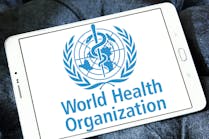HHS releases first federal strategy to increase youth sports participation
The U.S. Department of Health and Human Services released the National Youth Sports Strategy, the first federal roadmap that outlines steps that the nation can take to ensure that all youth have the opportunity, motivation, and access to play sports – regardless of their race, ethnicity, sex, ability or ZIP code.
The Strategy aims to achieve this goal by increasing participation in sports, increasing awareness of the benefits of sports participation, monitoring and evaluating youth sports participation, and recruiting and engaging volunteers in youth sports programming.
The Strategy was announced at Fort Dupont Ice Arena with Advisor to the President Ivanka Trump, HHS Secretary Alex Azar, and members of the President’s Council on Sports, Fitness & Nutrition.
HHS developed the National Youth Sports Strategy in response to President Donald Trump’s Executive Order 13824, which called for a national strategy to increase youth sports participation. According to the Physical Activity Guidelines for Americans, youth need at least 60 minutes a day of moderate-to-vigorous physical activity to stay healthy. Playing sports is one way youth can get the physical activity they need.
“We know that when youth are engaged in sports, their life outcomes are more positive and bright: They have increased graduation rates, higher wages, greater self-confidence and are better at working with others,” said Advisor to the President Ivanka Trump. “Yet, over the past decade youth participation in sports has declined. The Trump Administration is committed to reversing that trend and has implemented the first-ever national strategy. The work of the President’s Council is critical to increasing youth sports participation, regardless of age, gender, ZIP code or financial status.”
Not all youth have the same opportunity to participate in sports. For example, children from low income families, children with disabilities, and girls are less likely to participate. As part of the National Youth Sports Strategy, the HHS Office of Minority Health and the Office on Women’s Health announced $6.7 million in grants to 18 communities to promote youth sports participation. The two-year Youth Engagement in Sports: Collaboration to Improve Adolescent Physical Activity and Nutrition (YES) grants, will support local partnerships that offer youth sports and nutrition activities for racial and ethnic minorities, girls, and disadvantaged youth, particularly in areas where few youth programs exist. A full list of grant recipients is available at minorityhealth.hhs.gov.
“With this first-ever federal strategy to promote access to youth sports, President Trump is demonstrating his commitment to strengthening our communities and helping all Americans achieve better physical and mental health,” said Secretary Azar. “The National Youth Sports Strategy and the new YES grants will help expand sports opportunities for all youth, especially those less likely to have access to youth sports today, including girls, racial and ethnic minorities, kids from low-income neighborhoods, and kids with disabilities.”
Sports participation provides numerous benefits in addition to helping youth be more physically active. Benefits can include higher levels of perceived competence, confidence, and self-esteem; improved life skills, such as goal setting, time management, and work ethic; reduced risk of suicide and suicidal thoughts and tendencies; the opportunity to develop social and interpersonal skills, such as teamwork, leadership, and relationship building; and improved concentration, memory, school attendance, and academic performance. The National Youth Sports Strategy outlines actions steps for everyone from coaches and parents, to communities and local organizations to make youth sports safe, fun, and accessible by all.
The National Youth Sports Strategy is available at health.gov.




